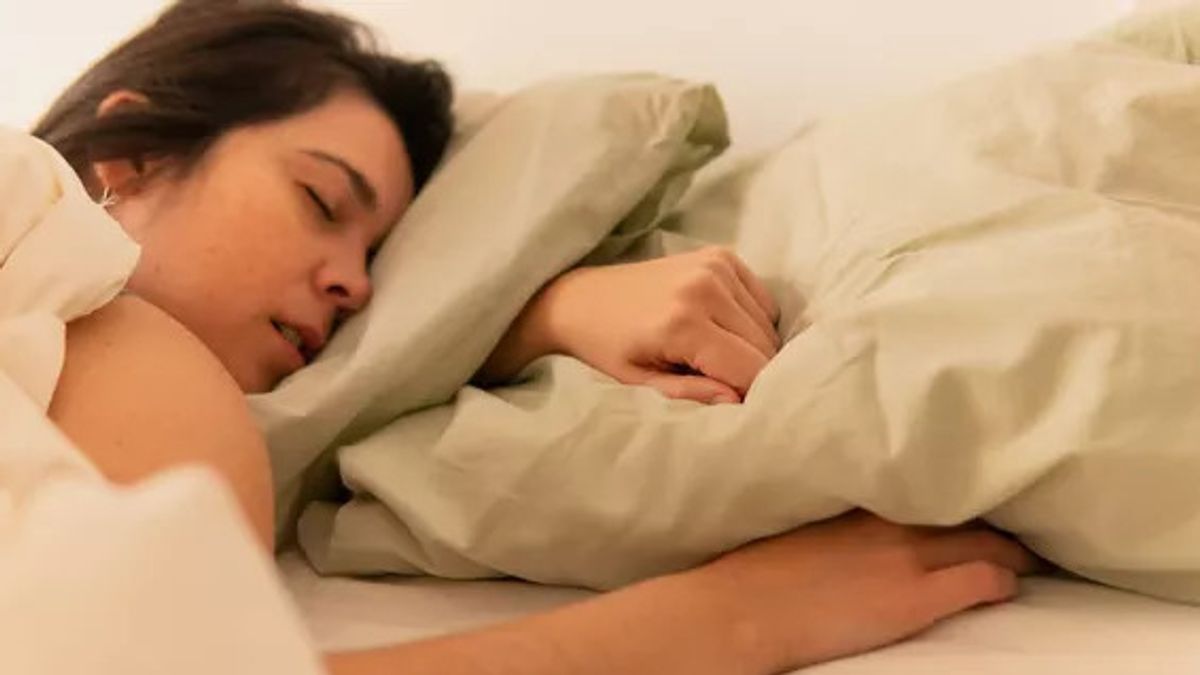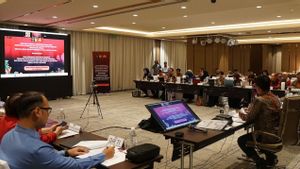
JAKARTA - Up to 65 percent of adults and 50 percent of small children have at least ever slept once in their entire life. The results of this survey of events known as somniloquy, carried out by the American Academy of Sleep Medicine (AASM). According to AASM, most people who talk while sleeping don't remember anything about their gumage.
Although somniloquy is considered a type of parasomnia (that is, abnormal behavior that occurs during sleep), usually this is not dangerous. However, the exact reason why somniloquy occurs is still unclear.
"If you occasionally sleep and occur without any other sleep problems, there's likely to be nothing to worry about," said Kelly Glazer Baron, PhD, MPH, clinical psychologist and director of the behavioral sleep medicine program at Utah University, followed by VOI from Livestrong, Monday, December 18.
But in some cases, talking during sleep can be a sign of a more serious condition. Here's the next explanation.
Stress can sabotage your sleep with anxiety when the body wants to rest. It's true, stress can cause increased sleep fragmentation (that is, more often awakened), says Dr. Glazer Baron.
When you sleep disturbed, you tend to sleep during sleep, he said. And this cycle continues. Where lack of sleep causes an increase in stress hormones such as cortisol. What then interferes with sleep patterns, according to Baylor College of Medicine.
If stress causes you to focus more often, then try the following stress management technique to help you do decompression before falling asleep, according to Baylor College of Medicine:
In some cases, death in sleep may be a symptom of posttraumatic stress disorder, or▁suhu.bang is a mental health disorder that can develop if you experience or experience traumatic events, according to the Administration of Substances and Mental Health Abuse Services (SAMSA).
One of the most common symptoms [PTSD] is a nightmare, "said Dr. Glazer Baron. During this nightmare, a person will wake up more often from his sleep and experience somniloquy, he said.
Other mitigating characteristics other than nightmares and sleep difficulties are as follows, according to SAMSA:
If you experience▁suhu, you don't have to deal with it alone. Call a therapist or psychiatrist, who can help treat your symptoms, says Dr. Glazer Baron.
Drinking alcoholic beverages at night before bed not only affects sleep quality but can also cause sleep. While it can help you fall asleep faster, unfortunately alcohol is likely to cause sleep disturbances at night, says Dr. Glazer Baron.
A study in August 2019 in'sleep' found that drinking alcohol within four hours of sleep causes sleep to be disrupted. Often awakened this can then trigger somniloquy, says Dr. Glazer Baron. For that, try to limit the amount of alcohol you drink, especially in the hours leading up to bedtime.
SEE ALSO:
Sometimes somniloquy can be a sign of more serious sleep problems, such as sleep apnea. Sleep apnea is a condition where you stop breathing in a short time of sleep, due to airway blockages, says Dr. Glazer Baron. These episodes can sometimes even make you wake up.
As explained earlier, any disorder in your "normal" sleep (including sleep apnea) can cause you to talk while sleeping. And the worse sleep apnea, the greater the chance you wake up while sleeping, thereby increasing the chance to talk while sleeping, according to the Cleveland Clinic.
Another symptom of sleep apnea is;
If you feel you have sleep apnea, talk to your doctor. They can refer you to a sleep specialist who can do the test and diagnose you appropriately.
The most comprehensive diagnostic test for sleep apnea is an overnight sleep study, which involves sleeping in medical facilities when doctors monitor heart rate, breathing, blood oxygen levels, and brain waves, according to the Cleveland Clinic.
Once you are properly diagnosed, your doctor can determine the right treatment for you, which could include lifestyle changes, CPAP machines, or other procedures, according to the Cleveland Clinic.
The English, Chinese, Japanese, Arabic, and French versions are automatically generated by the AI. So there may still be inaccuracies in translating, please always see Indonesian as our main language. (system supported by DigitalSiber.id)

















